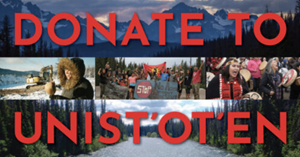The Law is in the Seed, directed by Veronika Soul explores a poem by Alex Jacobs of Akwesasne about the Haudenosaunee concept of law. Filmed in Kahnawá:ke, The Law is in the Seed features women and children reading the poem alongside the poet in the wake of the-recent hostilities of armed conflict that occurred because of their resistance before, during and after the Oka crisis. Speaking of the early concepts of democracy, Jacobs says, “...these seeds are from America”, the Great Law of Peace is the oral constitution of the Haudenosaunee. Bev Jacobs, the Associate Dean of Law at the University of Windsor states,
“Haudenosaunee legal traditions are based on peaceful relations with all of creation, responsibilities to the natural world and to the next seven generations” [1]
The film Invasion, documents the events that occurred in 2019 and beyond at the Unist’ot’en Camp, Gidimt’en checkpoint and within the larger Wet’suwet’en Nation. Assembled with footage by three filmmakers Michael Toledano, Sam Vinal and Franklin Lopez, the film makes clear how injunctions sought by pipeline companies and enforced by the RCMP, are a tool for criminalizing Indigenous peoples on their own territory and are violently disruptive of people, economies, land and non-human relations. Invasion shows how the injunctions ordered people to stop pipeline workers from gaining access to Wet’suwet’en territory, while serving to draw negative attention from the media, was vehemently resisted by Unist'ot'en who in response re-occupied remote parts of their land. This is just one of many communities working toward jurisdiction over their land.
Thirza Cuthand’s film, Extractions explores resource extraction as a way to dispossess Indigenous peoples of land and treaty rights. It also exposes the many dangers that come with resource extraction projects to the Indigenous women and girls who live near so-called “man camps,” or temporary housing facilities for predominantly male workers. She also draws comparisons to the extraction of Indigenous children from their families and cultures that benefits the social welfare system in Canada. This is called the Millennial Scoop, which has taken double the amount of children than from the 60’s Scoop era and has been dubbed a continuation of the Residential School System in Canada. Cuthand issues that apathy leads to more resource extraction and harm to the planet and yet she is hopeful for the future.
Ôtênaw by Conor McNally is the longest of the four films and offers beautiful respite through imagery and soundscapes within and around Amiskwaciwaskahikan, or Edmonton, Alberta. The film is shot in 16mm format and has imagery both real and abstracted. The film documents the oral storytelling through a walk with Dwayne Donald, a Cree educator from Treaty 6, Edmonton Canada. Donald explains that “stories that we are searching for to try to give us different ways to live together really are going to come from the connections to the places we live in, a much deeper way”. The stories that he generously shares from his own nêhiyawak philosophy alongside the film helps us to reflect on the stories of our own communities that have yet to be told.
[1] Jacobs, B. K. (2018, September 21). Impacts of Industrial and Resource Development on the Wholistic Health of Akwesasronon: A Human Responsibility/Rights Solution. Retrieved January 07, 2021, from
https://prism.ucalgary.ca/bitstream/handle/1880/108777/ucalgary_2018_jacobs_beverley.pdf
Thank-You, miigwetch, anushiik,yaw^ko to our audiences from across the US, Canada and Israel. We encourage you to support the film Invasion, Unist’ot’en continue to need funds to reoccupy their lands and fight in the colonial courts.
Please donate here.

Learn more about Land Back:
Land Back: A Yellow Head Institute Red Paper
What is Land Back? A Settler FAQ
Land Back! What do we mean? 4Rs Youth Movement
1492 Land Back Lane
CBC News Dudley George's death
Anishinabek News Land returned to Kettle and Stony Point
This is called the Millennial Scoop, which has taken double the amount of children than from the 60’s Scoop era and has been dubbed a continuation of the Residential School
System in Canada. Cuthand issues that apathy leads to more resource extraction and harm to the planet and yet she is hopeful for the future.